|
|
|
Sort Order |
|
|
|
Items / Page
|
|
|
|
|
|
|
| Srl | Item |
| 1 |
ID:
159801
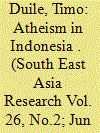

|
|
|
|
|
| Summary/Abstract |
The phenomenon of atheism has often been neglected in academic research on Indonesia, a Muslim majority country in which every citizen is supposed to have a religious affiliation. In addressing that oversight, this article first outlines the state-driven discourses and practices in Indonesia concerning atheism before exploring the alterative discourses and social practices found within Indonesian atheist communities. Based on a long-term engagement with online atheist communities and four months of fieldwork in Jakarta, I suggest that hegemonic discourses and state practices on the one hand, and discourses and social practices within the atheist community on the other hand, sharply contradict each other. Whereas the state and large parts of society still consider atheism a threat since it is understood to connote communism, it is typically leftist atheists rather than their right-wing or liberal counterparts who not only acknowledge religion but are even eager to engage with progressive religious movements. The reasons for this, the article argues, lie in alternative narratives of Indonesia’s past and in the atheists’ engagement with global discourses. Finally, the article provides an example of a progressive religious community in which leftist atheists are involved, revealing a social practice that successfully ruptures state-driven discourses.
|
|
|
|
|
|
|
|
|
|
|
|
|
|
|
|
| 2 |
ID:
168002
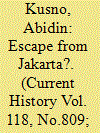

|
|
|
|
|
| Summary/Abstract |
“The lack of planning can be understood as an art of governing, for it ensures the operation of informality.”
|
|
|
|
|
|
|
|
|
|
|
|
|
|
|
|
| 3 |
ID:
086294
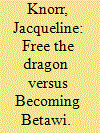

|
|
|
|
|
| Publication |
2009.
|
| Summary/Abstract |
The Chinese in Indonesia suffered considerable discrimination particularly during Suharto's rule (1967-1998). They were considered a foreign threat that needed to be kept under state control. Since the end of Suharto's regime and as a result of liberalisasi, demokratisasi and desentralisasi a revival of Chinese identity has set in, initiating a public discourse on the compatability of Chinese and Indonesian identity. This discourse refers to different categories of identification which are connected with specific conceptualizations concerning the interrelatedness of indigeneity, ethnicity and nationalism in Indonesia and Jakarta in particular.
1This paper is based on the analysis of the relevant literature concerning its theme and of the data gathered during field research in Jakarta between 2000 and 2002 and during shorter stays thereafter. Most responses and statements by informants quoted in this paper have been translated from Indonesian to English. In some cases, conversations and interviews took place in different languages besides Indonesian, namely in English, German and/or Dutch, because informants wanted to practise their foreign language knowledge.
|
|
|
|
|
|
|
|
|
|
|
|
|
|
|
|
| 4 |
ID:
096407
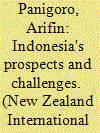

|
|
|
| 5 |
ID:
169784
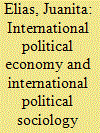

|
|
|
|
|
| Summary/Abstract |
Feminist International Political Economy (IPE), with its focus on the gendered dimensions of social reproduction and market life, provides ground for fruitful engagements between IPE and IPS. Indeed, from this perspective, the boundaries between IPE and IPS are much more porous than assumed in some other contributions to this forum. Pushing against the boundaries of narrowly demarcated disciplinary divides is something that feminist political economists have been actively engaged in since the early days. Our approach is one in which we call for a simultaneous recognition of both the ‘International’ and the ‘Everyday’ in research agendas, speaking as much to new research directions in the field of IPE as to writings in IPS. To illustrate our claim, this short piece reflects on a recent research project into the gendered everyday political economy of housing resettlement schemes in Jakarta, Indonesia – pointing to the interrelationships between everyday gendered practices of work, finance and caring, and how these relationships come to be transformed within the context of the global city. Such an intervention, we hope, points to the significant insights that a feminist lens brings to the development of an ever more sociologically informed international studies.
|
|
|
|
|
|
|
|
|
|
|
|
|
|
|
|
| 6 |
ID:
107601
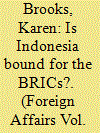

|
|
|
|
|
| Publication |
2011.
|
| Summary/Abstract |
As Indonesia hosts a number of high-level summits this year, it looks set to take its place among the world's economic superstars. But celebrations are premature: although the country has made great strides, its gains are reversible. For the country to continue to prosper, Jakarta must address rampant corruption and poor governance.
|
|
|
|
|
|
|
|
|
|
|
|
|
|
|
|
| 7 |
ID:
175076
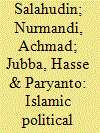

|
|
|
|
|
| Summary/Abstract |
This article analyses the polarisation of Islamic groupings in Indonesia which have taken place since 2017. It reviews the situation from the 2017 gubernatorial elections in Jakarta and the incident of the Ahok Video, during which the various Islamic factions were united, up to the 2019 elections, during which they polarised around the different presidential candidates and were unable to present a united front. This article analyses the division of Islamic groupings in Indonesia into traditionalist, fundamentalist and modernist, and looks at the interactions within them and between them on social media towards the 2019 campaign to better understand their positioning.
|
|
|
|
|
|
|
|
|
|
|
|
|
|
|
|
| 8 |
ID:
135013
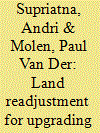

|
|
|
|
|
| Summary/Abstract |
A majority of Jakarta's population resides in unregulated and densely populated settlements called kampung, with no access to utilities. The urban development policy of previous municipal governments focused strongly on modernization of the city to the neglect of the poor kampung population. The Kampung Improvement Programme, started in 1969, is considered a notable exception to this tendency. However, despite efforts to improve the conditions in kampung, the number of kampung dwellers is increasing. The governor of Jakarta aims to revitalize 350 kampung in his first term of office (by 2017). This paper investigates whether the land readjustment procedure that is applied in many countries may contribute to the realization of this ambition. The findings indicate that such is indeed the case and a pilot project is recommended.
|
|
|
|
|
|
|
|
|
|
|
|
|
|
|
|
| 9 |
ID:
101990
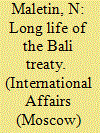

|
|
|
|
|
| Publication |
2010.
|
| Summary/Abstract |
UNTIL THE MID-1970S, Southeast Asia had very little in common with the region in which ASEAN came into being. With the end of the war in Indochina America dramatically cut down its military presence in the region; Vietnam was moving toward unification while Laos and Cambodia acquired left regimes.
|
|
|
|
|
|
|
|
|
|
|
|
|
|
|
|
| 10 |
ID:
152405
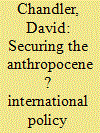

|
|
|
|
|
| Summary/Abstract |
This article analyses security discourses that are beginning to self-consciously take on board the shift towards the Anthropocene. It first sets out the developing episteme of the Anthropocene, highlighting the limits of instrumentalist cause-and-effect approaches to security, which are increasingly becoming displaced by discursive framings of securing as a process generated through new forms of mediation and agency and capable of grasping interrelations in a fluid context. This approach is the methodology of hacking: creatively composing and repurposing already existing forms of agency. It elaborates on hacking as a set of experimental practices and imaginaries of securing the Anthropocene, using as a case study the field of digital policy activism with a focus on community empowerment through social-technical assemblages being developed and applied in ‘the City of the Anthropocene’: Jakarta, Indonesia. The article concludes that policy interventions today cannot readily be grasped in modernist frameworks of ‘problem solving’ but should be seen more in terms of evolving and adaptive ‘life hacks’.
|
|
|
|
|
|
|
|
|
|
|
|
|
|
|
|
| 11 |
ID:
164716


|
|
|
|
|
| Summary/Abstract |
The dispossession of urban communities across class and racial lines is a global phenomenon linked to the expansion of international investment in the development of ‘exemplary’ city space. However, city evictions are also historically informed and gendered processes which are continuous with past colonial and postcolonial urban rationalisation projects. Drawing on testimonies of women evictees in Jakarta, as well as interviews with public housing managers, this article details the gendered nature of the rationalisation of urban life in the context of a contemporary evictions regime. We argue that the rationalisation of urban space serves to sharpen the gender order by placing material constraints on women's roles, limiting their economic activities and defining them as hygiene‐responsible housewives. Further, and in turn, the limited provision of ‘rusunawa’ public housing, which we show to be a gendered spatial and social transition informed by state doctrine on the family, provides the state with justification for dispossession itself. Finally, women's everyday acts of refusal and resistance show not only that kampung forms of social life continue to be preserved in Jakarta, but also that rationalisation itself is a negotiated and contingent process.
|
|
|
|
|
|
|
|
|
|
|
|
|
|
|
|
| 12 |
ID:
099943
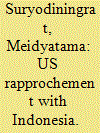

|
|
|
| 13 |
ID:
140390
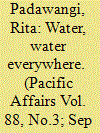

|
|
|
|
|
| Summary/Abstract |
Jakarta has entered an era of chronic flooding that is annually affecting tens of thousands of people, most of whom are crowded into low-income neighbourhoods in flood-prone areas of the city. As the greater Jakarta mega-urban region—Jabodetabek—approaches the 30 million population mark and the sources of flooding become ever more complex through combinations of global climate change and human transformations of the urban landscape, government responses to flooding pursued primarily through canal improvements fall further behind rising flood risks. Years of field observation, archival and ethnographic research are brought together in a political ecology framework to answer key questions concerning how government responses to flooding continue without significant participation of affected residents who are being compelled to relocate when floods occur. issue_image_88_3_PadawangiHow do urban development processes in Jakarta contribute to chronic flooding? How does flooding arise from and further generate compound disasters that cascade through Jakarta’s expanding mega-urban region? What is the potential for neighbourhoods and communities to collaboratively respond through socially and environmentally meaningful initiatives and activities to address chronic flooding? Floods, urban land use changes, spatial marginalization and community mobilization open new political dynamics and possibilities for addressing floods in ways that also assist neighbourhoods to gain resilience. The urgency of floods as problems to be solved is often interpreted as a need for immediate solutions, but flood-resilient communities are rooted in gains in resilience in non-emergency times by expanding rights to live in the city, to build houses and create vernacular communities by and for people
|
|
|
|
|
|
|
|
|
|
|
|
|
|
|
|
| 14 |
ID:
140853


|
|
|
|
|
| Summary/Abstract |
Although Jakarta seems to follow in the footsteps of other major Asian cities in its determination to flood the city with mega-developments, there are hesitations and interruptions along this seemingly smooth path. In the majority world, the onus of developing a viable place in the city largely fell to residents themselves, who then proceeded to elaborate intricate social and economic architectures of collaboration whose logics and operations were not easily translatable into the predominant categorizations employed by urban elites and authorities. These elites then attempted to disentangle these relationships, prioritizing the need for visibility, even as their own methods for retaining control were, themselves, usually opaque. This article explores how these ambiguous modalities of visibility are being reworked in contemporary Jakarta.
|
|
|
|
|
|
|
|
|
|
|
|
|
|
|
|
|
|
|
|
|